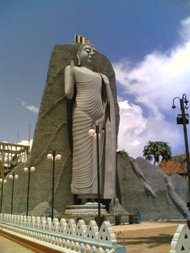Fairness fever
Sudu... a pathological obsession
By Namini Wijedasa
Even as we speak, Hollywood stars are digging into their pockets to pay for an artificial tan. Essentially, they want to be brown for Christmas - because they are “sick of pasty, white winter skin”.
Legions of other white-skinned people are sunning themselves on beaches in warm countries hoping to look like us when they get home.
Back here, though, advertisements for fairness creams are competing for public attention with bomb alerts and emergency numbers. A popular brand promises unmatched radiant fairness in four weeks. Beautiful, dark skinned women dramatically improve their marriage prospects by using the product (and presumably whitening their skins). Others clinch lucrative modelling contracts or TV jobs that they couldn’t secure as darker incarnations of themselves. There is even a fairness meter on offer, to determine just how much whiter your skin has become after piling on these creams.
Not only women
The fairness market is booming. And how? Soaps and creams have hit the shelves in Sri Lanka. Other products - including foaming cleansers, day lotions and night creams - are being sold through multi- level marketing and ‘down-liners’.
Unilever said that, according to LMRB Sri Lanka, 40% of Sri Lankan households buy fairness creams annually. Around 11% of households in Sri Lanka buy fairness creams monthly. Fair & Lovely has a 69% market share and sales have doubled over the past five years. “In short, the category of skin lightening or fairness creams is on a growth momentum in Sri Lanka,” Unilever concludes.
So, what is it about Sri Lanka and its fixation with fair? For one thing, the marriage proposals - as oft quoted as they may be - continue to entertain. Fairness is marketed (in different combinations) as a virtue that makes a person more marriageable. Pretty, fair, tall. Fair, pretty, smart. Slim, fair, pretty and very fluent in English. Very fair. Fair, slim, very pretty. Fair, slim with an excellent character and a new car (the car should do the trick, if nothing else does). By contrast, fairness is rarely used as a male qualification in the marriage proposals section. The parents of prospective bridegrooms are more likely to market their height, education and income than colour of skin. But they do look for “fair, pretty, slim” partners! The cheek of it, one might add.
Many Sri Lankan women hope to produce fair skinned children, particularly girls. I consider myself to be a relatively informed - dark skinned - modern woman. I know that skin colour is hereditary. Be that as it may, I confess that even I had a phase during my pregnancy when I downed glasses of warm milk and expensive imported saffron in the bizarre belief that my daughter would be born fair. I cringe when I recall this... but there it is. I know others who did the same and lamented that the seemingly timed-tested trick didn’t work.
Incidentally, my daughter was born rather white but that is more because she had just spent nine months inside an ill-lit womb with no hope of sunshine. However, I do still catch myself hoping (against myself) that her skin will retain the buttery colour it has now taken on.
Often, society insists on paleness as a prerequisite for beauty. It’s not uncommon to hear someone comment that somebody is “dark but beautiful” (kalu wunata lassanai). There are songs that take pains to emphasise that a certain kalu kella is prettier than other sudu kello. People even talk about skin colour in casual conversation. Much of this is harmless, although sometimes dark skin can be used as a derogatory label. For instance, yakek wagey kalui.
Clear skin
“I suppose people prefer fair skin because it’s prettier to look at,” mused renowned beautician Nayana Karunaratne, founder of the Sri Lanka Association of Hairdressers and Beauticians. “It has nothing to do with Western concepts or the colonial hangover because Sri Lankans wanted to be fair even before the white people came here. They applied various things on their skin for this purpose.”
Asked whether she felt fair skin was more attractive, she said: “No. I think the most beautiful asset is clear skin. A lot of black men and women look fantastic with clear, shining, healthy skin.”
Questioned, then, whether she thought the passion for paleness was harmful, she replied: “I don’t think it’s a bad thing at all, wanting to be a little fairer.” At the same time, she cautioned strongly that, “No one can never ever become fairer than what he or she was born with. That is one hundred per cent sure.”
Skin can, however, get burnt strongly and harshly in Sri Lanka’s climate. “Most sunburn can be removed very easily,” Nayana said. “But to be effective, bleaching and skin lightening products have to be used monthly because the epidermal layer renews itself every 28 days. So you may acquire a lighter skin, provided it was originally light, but unfortunately it’s going to fall off next month my dear, and you will have to start over.”
Nayana said also that skin lightening products are not harmful because they mostly use fruit acids to do the job. Unilever said Fair & Lovely uses a combination of vitamin B3 and UV-A + UV-B sunscreens.
The company maintained, too, that Asian women do not use skin lightening creams to look like European women. Most Asian women aspire to a tone which is one or two shades lighter than theirs.
On a psychological level, however, this fairness obsession can be traumatic for some. A friend has a dark skinned daughter and a fair skinned one. Both are beautiful, with exquisite features.
The dark one is just five-years-old. The fair one is two. Both have often been exposed to discussions about the difference in their skin colour. One day, they were sharing a bathtub when my friend spied the dark one rubbing her hands over the fair one’s arms and then rubbing her own skin, saying, “I want to be white like you.”
My friend also recalls going to a party where several women, observing her fairer offspring, pointedly told her: “You have a beautiful daughter.” My friend responded sharply: “Thank you, but I have two beautiful daughters.” Not that it made a difference. The fairness madness is too ingrained in the Sri Lankan psyche.
So it endures, this mania. People everywhere in the country are aspiring to achieve greater whiteness - or white greatness. But judging by the marriage proposals, there aren’t many women who need assistance.
Every other marriageable girl in the country is already fair. And pretty. And slim.





No comments:
Post a Comment